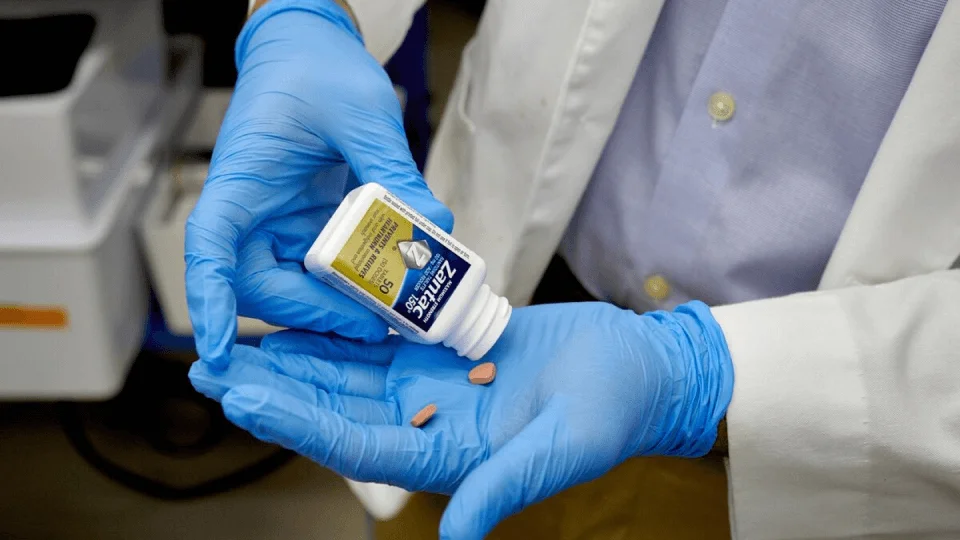- Home
- Active Lawsuits
- Camp Lejeune
- Roundup
- Talcum Powder Lawsuit
- Bard PowerPort Catheters
- AFFF Exposure
- Toxic Baby Formula (NEC)
- CPAP Lawsuit
- Hair Straightner Lawsuit
- Paraquat
- PFAS Contamination Lawsuit
- Zantac Lawsuit
- Rideshare Lawsuit (Driver)
- Rideshare Lawsuit (Passenger)
- Depo-Provera Lawsuit
- Motor Vehicle Accident Lawsuit
- LDS Sex Abuse Lawsuit
- Oxbryta Lawsuits
- Sexual Abuse Lawsuit
- Roblox Addiction Lawsuit
- Blogs
- Contact Us
Zantac Lawsuit
- Home
- Zantac Lawsuit
Zantac Lawsuit
What is Zantac Lawsuit?
Zantac was a popular antacid drug since the 1980’s. Ranitidine hydrochloride, better known under the commercial name Zantac, was an antacid medication available as an over-the-counter drug and by prescription from a physician. Millions of people used the drug to treat acid reflux, heartburn, Barrett’s esophagus, gastric and duodenal ulcers, gastroesophageal reflux disease (or GERD), and other gastrointestinal issues.

LAWSUIT WILL NOT AFFECT YOUR ELIGIBILITY TO COLLECT VA DISABILITY BENEFITS.
It belongs to the class of drugs known as H2 (or histamine02) blockers. OTC ranitidine was commonly used to relieve and prevent heartburn. Prescription strengths were also used to treat and prevent more severe ulcers in the stomach and intestines.
Based upon the FDA’s ongoing investigation, levels of a carcinogen called nitrosamine (N-nitrosodimethylamine or NDMA) in the heartburn medication increase over time and posed a risk of cancer when stored at higher than room temperatures.
How Do I Get Compensated?
Fill Out The Form
Fill in the form to see if you qualify.
Speak With Our Specialists
We'll review your submission quickly and then follow up with you.
Potential Compensation
Receive the justice and potential compensation that you and your loved ones deserve.

Which Cancers Were Named in Zantac Lawsuits?
People who have taken Zantac and filed lawsuits reported a wide variety of cancers linked to the drug and NDMA.Many doctors who diagnosed people with cancer after taking Zantac said they had no family history or genetic markers for cancer, according to Zantac lawyers. Instead, doctors told patients it was caused by something from their environment, which could include NDMA contamination.
Cancers that qualified for Zantac lawsuits include:
- Bladder Cancer
- Liver Cancer
- Pancreatic Cancer
- Esophageal Cancer
- Gastric/Stomach (No intestinal) Cancer
- Breast Cancer
- Colorectal Cancer
- Kidney Cancer
- Prostate Cancer
Of the cancers linked to Zantac, bladder cancer has the strongest connection. If you developed one of the above cancers after taking Zantac between January 2000 and present, make sure you contact an attorney to see if you qualify to file a lawsuit.
Other Health Issues That May Appear with a Zantac Cancer Diagnosis
Doctors who diagnosed people with cancer after taking Zantac also diagnosed them with primary pulmonary hypertension (PPH) and Crohn’s disease.
Health conditions associated with Zantac use included in lawsuits include
Primary Pulmonary Hypertension (PPH) is a rare lung disorder that causes high blood pressure in the lungs. It happens when the blood vessels in the lungs narrow and raise the pressure in the pulmonary artery above normal levels.
Crohn’s disease is a type of inflammatory bowel disease. It causes the digestive tract to become inflamed and this causes severe diarrhea, abdominal pain, cramps and weight loss.
field of expertise
Who Qualified for a Zantac Lawsuit?
People who filed Zantac lawsuits took brand-name Zantac and had to meet several criteria to qualify to file a lawsuit. Generic ranitidine was not included in lawsuits.
Those who qualified for a Zantac lawsuit satisfied several conditions:
- Have taken brand-name Zantac made with ranitidine for at least one year before being diagnosed with cancer.
- Been diagnosed with bladder, stomach, esophageal, liver or pancreatic cancer.
- Be younger than 20 years of age between the last time they took Zantac and their first cancer diagnosis
- Be younger than 89 years old at the time of their first cancer diagnosis.
- Have used Zantac at least once a week for one year or longer.

Latest Zantac Lawsuit Settlements
1
In May 2024, Sanofi agreed to pay between $200 million and $250 million to settle more than 10,000 Zantac lawsuits.
2
In April, 2024, Sanofi offered $100 million to settle 4,000 Zantac lawsuits.
3
GlaxoSmithKline also settled multiple cases confidentially early in 2024.
4
As of July 2024, 14,401 Zantac lawsuits were pending in a multidistrict litigation in the U.S. District Court for the Southern District of Florida.
DO I Qualify For A Lawsuit?
How do I qualify for a Zantac lawsuit?
To find out if you qualify for a Zantac lawsuit submit your information on havealawyer.com. If you took brand name Zantac made with ranitidine and developed bladder cancer, you may qualify. Other cancers are named in some lawsuits, but bladder cancer has the strongest link. Zantac lawyers are not accepting cases for generic ranitidine.
Lawyers are the only ones who can properly evaluate a claim, and they can help gather medical records and evidence to build a case.
Mass Tort vs. Class Action
What Are the Differences Between Mass Tort And Class Action Lawsuits?
STRUCTURE
1.Mass Tort: Consists of several individual lawsuits grouped together based on common case details or defendants.
2.Class Action Lawsuit: A single lawsuit developed for a larger group--the "class"--who are represented by a single plaintiff.
INDIVIDUAL CONTROL
1.Mass Tort: Each individual plaintiff has control over their case and its resolution.
2.Class Action Lawsuit: Members of the class have limited control over the lawsuit, as case decisions are made by the single representative plaintiff and their legal team
COMPENSATION
1.Mass Tort: Compensation and settlements are determined case by case, in consideration each plaintiff's unique circumstances and harm suffered.
2.Class Action Lawsuits: Compensation and settlements are typically distributed evenly among all class members, often based on a pro-rata structure.
APPLICABILITY
1.Mass Tort: Best for situations when each plaintiff's case is distinguished by different degrees of harm or other circumstances.
2.Class Action Lawsuits: Ideal when the members of the class all share similar claims and a uniform resolution is fair or reasonable.
EFFICIENCY
1.Mass Tort: Can be more time-consuming and complex since each case may require individual management.
2.Class Action Lawsuits: Generally more efficient as terms, negotiations, and resolutions apply more equally to all claimants.
